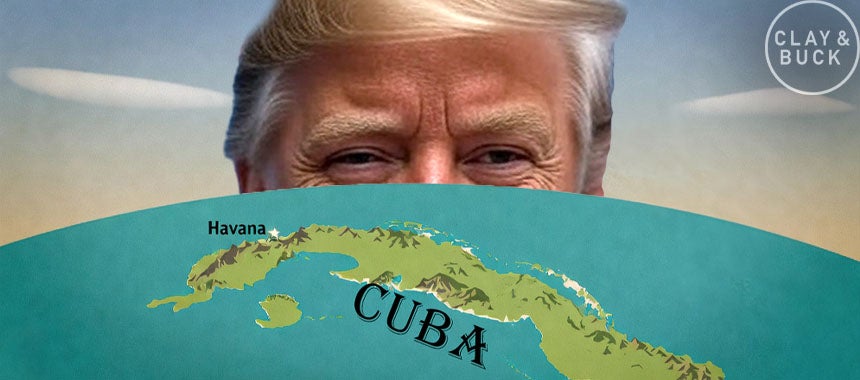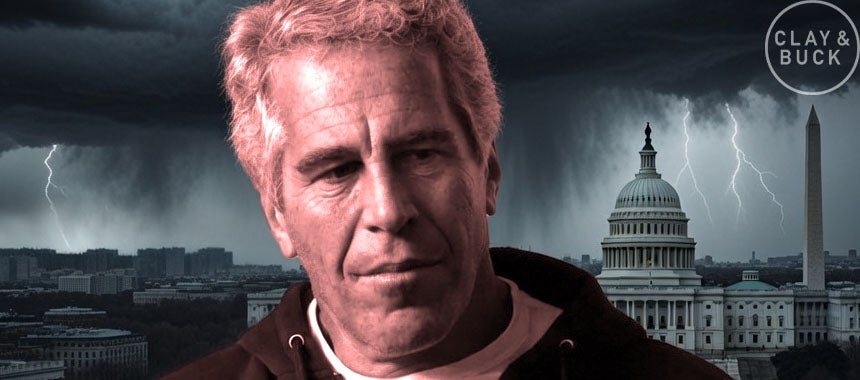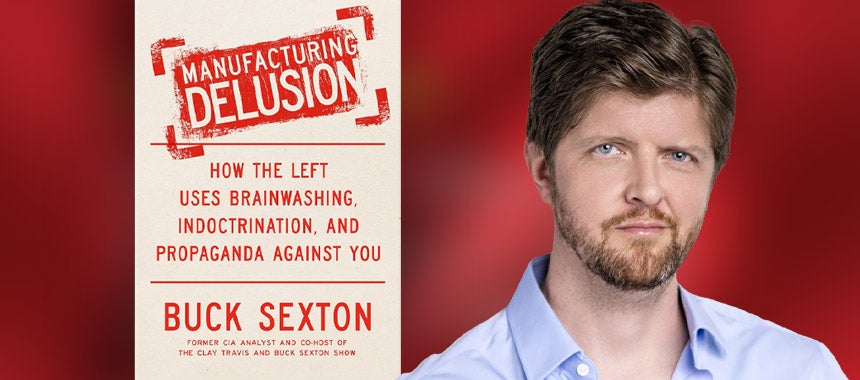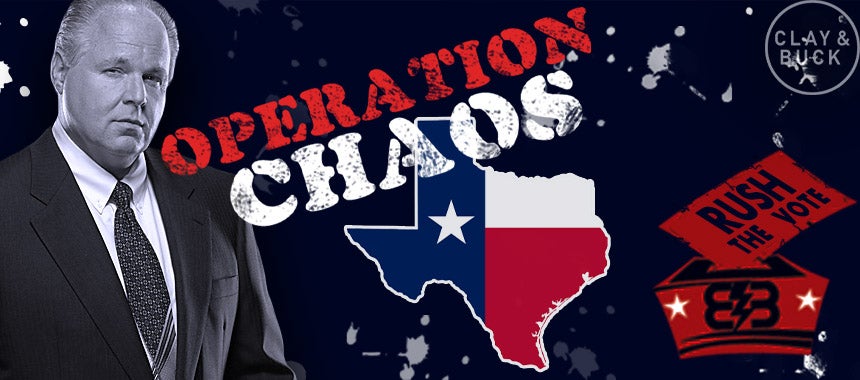Mark Morgan on How to Secure Our Border
21 Dec 2022
CLAY: We bring in now Mark Morgan, appreciate him joining us to talk about this situation on the border. And I want to start with this, Mark. When you see that we are spending billions of dollars to protect the Ukrainian border, including a total now of $100 billion for Ukraine. What would it cost, in your mind, for the United States southern border to be as secure as possible? How much would our government have to commit in order to make that possible?
MORGAN: Less than that, Clay, I can tell you. Right now, what’s also frustrating to me, right now in the current version of the omnibus spending bill that the Senate is trying to push forward, there’s actually language in there that actually gives funding, United States gives funding to other countries to, quote, secure their borders, yet Representative Bishop, he did a line-item search and he found out that in this current bill that billions of dollars that they’re giving to DHS specifically in the bill, says they’re forbidden to use it, quote, for border security. They can only use the money for processing.
…but at the same time, allocates $410 million towards border security for Jordan, Lebanon, Egypt, Tunisia, and Oman.
America Last in action. pic.twitter.com/KSkgtTEtmL
— Rep. Dan Bishop (@RepDanBishop) December 20, 2022
They finally said out loud and put in black and white what we’ve been saying for over two years. They don’t care about border security. They don’t care about the downstream negative effects to America. All they care about is getting money down there to be able to get better at processing and releasing illegal aliens into the country, because at the end of the day, Clay, they see perceived political benefit from what they’re doing. They don’t care that they’re unsecure on the border.
CLAY: Okay. So, a lot of people out there, there’s so many different moving parts of ineptitude in the Biden administration right now. Frankly, it’s kind of hard to keep up with all of it. So, you are an expert on this. Title 42 is currently held up at the United States Supreme Court. It’s unclear whether it is going to be repealed, cease to exist effectively. What is Title 42 for our audience out there that may not be able to keep on top of all these details? And what would the immediate impact be of Title 42 effectively ceasing to exist at our border?
MORGAN: Yeah. So, those are two very important questions. So, what is Title 42? Real quick. This was a law that was enacted in the forties and it’s a public health order. It’s not an immigration tool. And that’s very clear. Under the Trump administration, we resurrected that 1940 law that was in place during a global pandemic called covid-19. And what that allowed immigration law enforcement officials to do is rather than apprehend and release individuals into the country to further reduce and introduce the spread of covid-19 into our country from outside our borders, we used that to actually not allow illegal aliens to come in and remove them back to Mexico. And in my opinion, by doing so, it saved countless American lives.
NEW: Several mass illegal crossings in Eagle Pass, TX overnight, including this group of several hundred that crossed before sunrise. Title 42 remains in effect, but most of the people crossing in this sector are from countries T42 isn’t enforced on, & majority are released. pic.twitter.com/tBPfhSzSRv
— Bill Melugin (@BillFOXLA) December 21, 2022
This administration, from day one, it’s funny that they actually accused us of using it as an immigration tool, which the facts just simply deny that and here’s why. Because we applied it to everybody. If you say there’s a public health crisis, then you should apply it across the board. From day one, this administration started doing what I call political carve out. They stopped applying it to unaccompanied minors. They stopped applying it to families, even though all those individuals can still carry covid-19 and they are the ones that really use this as an immigration tool. Here’s what’s going to happen is… real quick, I know I’m going long here, but this is very important. I’ll try to wrap it up.
It is that people are saying, “Oh, once Title 42 ends, oh, it’s a crisis.” “Oh, once Title 42 ends we’re going to see a tsunami of illegal aliens.” No, that’s a lie. That’s false. We’re already in the tsunami. We’re already in the middle of the crisis. We are right now navigating — we have been for the past two years — the worst unmitigated, self-inflicted crisis along our border in our lifetime. And that’s been with Title 42 in place for the past two years. Once Title 42 ends, it’s just going to take the catastrophic crisis and, believe it or not, it’s just going to make it worse.
CLAY: The number of people that are crossing right now, compared to what you’ve seen in your life of knowledge dealing with the border, how would you classify it now?
MORGAN: It is another critically important question for comparison, and I’ll give you an example. So, Secretary Jeh Johnson, remember he was the secretary of DHS under then President Obama and Vice President Biden. And I know this because I was chief of the Border Patrol when he was the secretary. He said that a thousand a day is a crisis, that a thousand a day is a bad day. When I was the commissioner under President Trump, we had that below a thousand a day. Now, look, that’s still not good. But just as a comparison, we had it below a thousand a day. Right now, it’s at over 8,000 per day. That’s what we have right now. It’s unmitigated. It’s unsustainable.
Every aspect of our resources are overwhelmed. You have many areas on the southwest border where 90% (nine zero) Border Patrol agents are pulled off the foot line, off the national security mission, and they’re back in facilities to process the millions of illegal aliens coming through. That literally has operational control over the cartels. And what’s happening? They’re pushing drugs across to criminal aliens and potential national security threats every day, all day long. That’s where we’re at. That’s where we’re at right now. And we have been for the past 23 months with Title 42. So, the crisis, isn’t going to begin when it ends. It’s just going to make it worse.
Cartels overwhelming border patrol officals on the Yuma side after smuggling in several groups from migrants mostly from South America as migrants are anticipating the ending of Title 42. This is the current scene as we approached 3 am on the Yuma border @DailyCaller pic.twitter.com/zGkUpBzTXG
— Jorge Ventura Media (@VenturaReport) December 21, 2022
CLAY: Mark Morgan, former acting commissioner of Customs and Border Protection, you mentioned the cartel. We know that there’s tons of fentanyl coming across the border that’s killing over 100,000 Americans every single year right now. I read and I believe this is the New York Times, so credit to them for actually managing to cover this, that the cartel is making 13 billion. That’s billion with a B. $13 billion a year smuggling people illegally across the border. And to put that into context, that’s more than any American pro sports league makes the NFL, the NBA, Major League Baseball. How powerful is the cartel right now and how much, in your experience, have they taken over not just drug smuggling, but also person smuggling, people into this country?
MORGAN: Look, I’ll come back and talk to you in time because you’re very well versed in that. So, first of all, you’re exactly right. 13 billion in some cases, that’s a greater GDP than some countries. And, I think, to put that 13 billion to even more greater context. So, that’s from 2018. That’s just the smuggling, not drugs, as you said, just the smuggling. It went from a $500 million business in 2018 to 13 billion right now.
CLAY: So, just yeah, it’s crazy.
MORGAN: You’re right. And most of that has happened in the past two years. And we haven’t talked about the billions they get from their drugs. And here’s the issue. It’s that the cartels, they do it all, right? So, they’re a multi-layered, multifaceted, criminal organization. I keep saying the cartels are the most powerful criminal organization in the world. So, it’s not just smuggling, but smuggling drugs. It’s anything that they can do to make a profit. They don’t care about the devastation that causes the individuals involved or this country. In the past two years, their bank accounts have grown, but not just their bank accounts.
So, has their power, influence and reach. A lot of people think they are just in Mexico. That’s just not true. They’re in every state in this country, their reach goes to, as well as other countries in the Western Hemisphere and beyond. They are a dangerous, ruthless entity that is 100% behind this. And that’s why Governor Abbott, I’m 100% behind him when he declared that his state is being invaded because what he’s done by that through the constitutional clause, he’s declared war on the cartels, which is exactly what we should be doing.
CLAY: Which is why for people out there listening who don’t live near the border, so many people who do live near the border, even if they were born in Mexico, even if they were born in Latin America, they want border enforcement as well because they are terrified of the cartels. And they know better than most the amount of power and violent power that these guys are bringing to bear on the border. We’re talking to Mark Morgan, former acting commissioner of Customs and Border Protection. Okay. So, the other thing that I think many people are missing is traditionally when we’ve talked about illegal immigration, it’s been people relatively close to our southern border.
 Now, all over the world, you can correct me if I’m wrong, but it basically has become well known that the United States is essentially letting anybody walk across the border that can get there. And so now we have people from all over the world that are coming to Latin America and trying to cross into the United States. That has accelerated probably to a degree we’ve never seen before. Again, these aren’t just people in geographic proximity necessarily who are coming to our southern border. They’re coming from everywhere to walk across our southern border.
Now, all over the world, you can correct me if I’m wrong, but it basically has become well known that the United States is essentially letting anybody walk across the border that can get there. And so now we have people from all over the world that are coming to Latin America and trying to cross into the United States. That has accelerated probably to a degree we’ve never seen before. Again, these aren’t just people in geographic proximity necessarily who are coming to our southern border. They’re coming from everywhere to walk across our southern border.
MORGAN: Clay, you’re 100% right. And this is another very important element, because sometimes people like to do comparison back in the late nineties and 2000 with respect to the numbers. And you can’t do that because back in the late nineties and 2000, almost 100% of the illegal aliens we’re saying is what you described early on. Right. But there’s been a change.
CLAY: And those guys, by the way, sorry to cut you off, but what’s significant about that is, those guys might travel to the United States to work, but they still kind of thought of themselves as primarily living in Mexico. They might go back and forth across the border as opposed to trying to make their permanent homes. If you’re coming from somewhere far around the world, you’re not coming here for seasonal work and you’re certainly not returning back across the southern border. That’s a seismic change in terms of border security in general, right?
MORGAN: Absolutely. Seismic change, and that’s the right adjective. So again, late nineties, 2000, it was almost 100% Mexican single adults, as you describe. You’re spot on. Now, I’ll give you an example just to put stop everything you said. The last two years, CBP has encountered illegal aliens or otherwise inadmissible aliens from 160 different countries, 160. There’s only 195 recognized countries in the world. Just think about that. Let that soak in for a second. Look, it’s not just the Western Hemisphere, you know, it’s not just Mexico, the Northern Triangle countries or the entire Western Hemisphere. Clay, as you said, it’s the entire world.
In fact, there are many, what we call special interest countries. There are many illegal aliens coming from these special interest countries that we’re concerned about because we have intelligence that these countries are either connected to or helping finance terrorist or terrorist activities. It’s happening every single day. We know that last fiscal year alone that CBP encountered 98 illegal aliens on the FBI’s terror screening database. 98 in a 12-month period. That’s more than the past five, six, seven years combined. And why should it matter to us? Well, “Mark, look, they’re doing a great job in countering.”
No, no. Because they’re pulled off the line because of this administration’s open border policies. There’s been over 1.2 million gotaways, over a million gotaways, Clary. So, look, it’s not hyperbolic to say, for example, that we could have the next terrorist sleeper cell in the United States planning the next terrorist attack and we would have no idea. Look, the worst terrorist attack in our lifetime, 9/11, took about a dozen people. The bombing in Boston Marathon took two people. I mean, this is a real national security threat.
CLAY: All right. So, this is all incredibly negative. And we know things are just getting worse with everything that Joe Biden touches. If we were actually committed to border security, how much would it cost? How quickly could this be reversed?
MORGAN: So, look, this is very important because we have to differentiate between resources and policy. Right? This is not a sole resource issue. Now, don’t get me wrong. A lot of people “Oh, so, you know, foreign commission said we don’t need more resources.” I’m not saying that. Now, we need a tried, true a multilayer strategy of infrastructure, technology and personnel wherever we have that right lay down, every single measure of success goes up. So, we need to build more wall. We need to make sure we have increased technology in between at the ports, and we need to have the right level of personnel. But look, you can have all of that.
 But as long as you still have the open-border policies, illegal aliens are still going to come. Resources are going to be pulled off the line. No matter how much you put on there, our borders are going to be open. So, what we need to focus on are policy issues which cost us zero, Clay, zero. For Congress to step up and finally do what they should do to protect this America, to protect this country. They should pass meaningful legislation to secure our border. We provided them what they need to do and what the legislation they need to pass that will cost American taxpayers zero. Reinstate the Remain-in-Mexico program. Reinstate those safe third country agreements. Reinstate ICE’s ability to actually do their job to remove criminal illegal aliens that are here. We could go on forever. That’s just the tip of the iceberg.
But as long as you still have the open-border policies, illegal aliens are still going to come. Resources are going to be pulled off the line. No matter how much you put on there, our borders are going to be open. So, what we need to focus on are policy issues which cost us zero, Clay, zero. For Congress to step up and finally do what they should do to protect this America, to protect this country. They should pass meaningful legislation to secure our border. We provided them what they need to do and what the legislation they need to pass that will cost American taxpayers zero. Reinstate the Remain-in-Mexico program. Reinstate those safe third country agreements. Reinstate ICE’s ability to actually do their job to remove criminal illegal aliens that are here. We could go on forever. That’s just the tip of the iceberg.
CLAY: Good stuff. Mark Morgan. Hopefully you’ll be working with people to actually do all those things at some point in the near future. Although when you see Republicans rushing to spend $1.7 trillion, you do wonder whether they’ll actually do what they promised to do even if we vote for them. Appreciate the time, my man.
MORGAN: You bet. Thanks, Clay. Merry Christmas.
CLAY: Merry Christmas to you as well. That’s Mark Morgan, former acting commissioner of Customs and Border Protection.
Recent Stories

Political Commentator Debra Lea Talks the Mood in Israel and the Deadline for Iran
Just back from Israel and with an eye on Iran, Debra starts by making a point: She's not in the Mossad.

President Trump Says We May Just Do a “Friendly Takeover” of Cuba
Capitalism, and President Trump, can make Cuba great again (especially if the Supreme Court rules that the communists have to give back all they stole).

We Would Never Cover Up for People Accused of Epstein’s Crimes
If you think members of the administration are covering up for heinous acts against children, you're wrong.

Manufacturing Delusion Is On Sale Now!
Buck's book opens at #4 on the New York Times bestseller list. Get your copy today!

Operation Chaos Lives in Texas! Republicans Voting Crockett?
Rush's Operation Chaos reborn in the Lone Star state!





